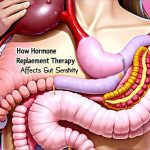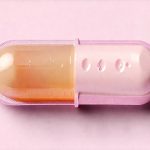Long-term use of hormonal birth control or hormone replacement therapy (HRT) can profoundly impact our bodies, extending beyond reproductive function. While these therapies offer significant benefits for many individuals – cycle regulation, contraception, symptom management during perimenopause and menopause – they also introduce a complex interplay with the gut microbiome. This often overlooked connection is increasingly recognized as crucial to overall health and wellbeing. The hormonal fluctuations induced by both birth control and HRT can disrupt the delicate balance of bacteria within our digestive system, potentially leading to dysbiosis (an imbalance in gut flora) and associated symptoms. Understanding this relationship is key to proactively supporting gut health and restoring optimal function after discontinuing these therapies or during prolonged use.
The gut microbiome isn’t merely a passive bystander; it actively participates in numerous physiological processes essential for health, including digestion, nutrient absorption, immune regulation, and even mental wellbeing through the gut-brain axis. Hormonal shifts can alter the composition of this microbial community, influencing its diversity and function. For example, estrogen significantly impacts gut barrier integrity and permeability – often referred to as “leaky gut” – while progesterone influences gut motility. These changes aren’t always negative but prolonged hormonal disruption can create an environment where less beneficial bacteria thrive, potentially leading to digestive discomfort, weakened immunity, mood alterations, and other health concerns. This article will explore the nuances of this relationship and provide insights into strategies for supporting gut restoration after long-term birth control or HRT use.
Hormonal Disruption & The Gut Microbiome
The connection between hormones and the gut microbiome is bidirectional. Meaning, hormones influence the microbiome and the microbiome influences hormone metabolism. Birth control pills, primarily containing estrogen and progestin, alter the natural hormonal environment of the body. These synthetic hormones aren’t identical to those produced naturally and are processed differently, impacting both overall hormone levels and their effects on gut health. Similarly, HRT aims to replenish declining estrogen and progesterone during perimenopause/menopause but can still introduce imbalances or variations from a woman’s natural hormonal cycle, leading to changes in the microbiome composition.
Specifically, high estrogen levels (often resulting from birth control) have been linked to reduced microbial diversity and an increase in certain bacterial species that may contribute to inflammation. Conversely, lower estrogen levels (as seen during menopause and sometimes with HRT formulations) can lead to a decrease in beneficial bacteria like Lactobacillus and Bifidobacterium, which play vital roles in maintaining gut barrier function and immune regulation. Progestins, also common in birth control pills, can affect gut motility, potentially leading to constipation or altered bowel movements – further impacting the microbiome’s environment. It’s important to remember that everyone responds differently; factors like diet, lifestyle, genetics, and the specific formulation of hormone therapy all play a role.
Beyond direct hormonal effects, changes in dietary habits often accompany these therapies. Individuals experiencing side effects from birth control or HRT might alter their diets, seeking ways to manage symptoms which can inadvertently impact gut health. For instance, increased sugar intake to cope with mood swings or reliance on processed foods for convenience can negatively influence the microbiome, exacerbating existing imbalances. Therefore, a holistic approach considering both hormonal impacts and lifestyle factors is vital for effective gut restoration.
Restoring Gut Barrier Integrity
A compromised gut barrier – often referred to as “leaky gut” – allows undigested food particles, toxins, and bacteria to enter the bloodstream, triggering an immune response and potentially contributing to systemic inflammation. Hormonal fluctuations can directly contribute to increased intestinal permeability, making this a significant concern for individuals on long-term birth control or HRT. Restoring gut barrier integrity is therefore a crucial first step in gut restoration.
Here are some strategies to support gut barrier function:
1. Consume collagen-rich foods: Bone broth, gelatin, and collagen supplements provide the building blocks for repairing damaged intestinal lining.
2. Incorporate glutamine: L-glutamine, an amino acid, is essential for maintaining the health of intestinal cells and reducing inflammation. It can be found in foods like beef, chicken, fish, eggs, spinach and cabbage or as a supplement.
3. Reduce inflammatory triggers: Identify and eliminate food sensitivities (such as gluten, dairy, soy) that might contribute to gut inflammation and permeability.
Furthermore, zinc is vital for maintaining the integrity of the intestinal lining. Deficiencies in zinc are common with long-term hormonal birth control use as it impacts nutrient absorption. A diet rich in zinc-containing foods like oysters, beef, pumpkin seeds, or supplementation (under healthcare guidance) can be beneficial. Addressing stress levels also plays a role, as chronic stress weakens gut barrier function and increases intestinal permeability. Understanding stomach heaviness can also help you manage your symptoms.
The Role of Prebiotics & Probiotics
While restoring the gut barrier is foundational, actively replenishing beneficial bacteria through prebiotics and probiotics is essential for rebuilding a healthy microbiome. Probiotics are live microorganisms that, when consumed in adequate amounts, confer a health benefit on the host. They help repopulate the gut with beneficial bacteria, improving digestion, enhancing immune function, and competing with harmful pathogens. Prebiotics, on the other hand, are non-digestible fibers that serve as food for these beneficial bacteria, promoting their growth and activity.
Choosing the right probiotic is crucial. Look for strains specifically researched for their impact on gut health and hormonal balance. Some well-studied strains include:
– Lactobacillus rhamnosus GG – known to support immune function and reduce inflammation.
– Bifidobacterium infantis – shown to improve gut barrier integrity and alleviate digestive symptoms.
– Saccharomyces boulardii – a beneficial yeast that can help combat imbalances caused by antibiotic use or dysbiosis.
Prebiotic-rich foods include garlic, onions, leeks, asparagus, bananas, oats, and apples. Incorporating these into the diet provides sustained nourishment for your gut bacteria. Fermented foods like sauerkraut, kimchi, kefir, and yogurt are also excellent sources of probiotics and prebiotics. However, introducing probiotics too quickly or in high doses can sometimes cause temporary digestive upset; start slowly and gradually increase intake as tolerated. Consider combining probiotics with dietary changes for best results.
Dietary & Lifestyle Considerations
Gut restoration isn’t solely about supplements and specific foods; it’s deeply intertwined with overall lifestyle factors. A whole-foods diet rich in fiber, fruits, vegetables, lean protein, and healthy fats provides the building blocks for a thriving microbiome. Reducing processed foods, sugar intake, and excessive alcohol consumption minimizes inflammation and supports gut health. Hydration is also paramount, as adequate water intake aids digestion and promotes regular bowel movements.
Beyond diet, stress management plays a crucial role. Chronic stress disrupts the gut-brain axis, negatively impacting microbial balance and increasing intestinal permeability. Incorporating stress-reducing practices like yoga, meditation, deep breathing exercises, or spending time in nature can significantly benefit gut health. Regular physical activity also contributes to a healthy microbiome by promoting gut motility and reducing inflammation. Finally, ensuring adequate sleep is essential for overall health and gut function, as sleep deprivation disrupts the circadian rhythm and negatively impacts microbial diversity. If you notice acid buildup after meals, adjust your lifestyle accordingly.
In conclusion, restoring gut health after long-term hormonal birth control or HRT requires a multifaceted approach that addresses both the direct hormonal impacts and underlying lifestyle factors. By focusing on gut barrier integrity, replenishing beneficial bacteria with prebiotics and probiotics, and adopting a holistic lifestyle prioritizing diet, stress management, sleep, and exercise, individuals can support their microbiome and promote optimal health and wellbeing. It is always recommended to consult with a healthcare professional for personalized guidance tailored to your specific needs and circumstances. Remember that hormonal birth control can have a significant impact on digestion, and addressing this is crucial. Don’t underestimate the importance of gut resilience after illness or dietary changes. Finally, avoid moving too quickly after meals to aid digestion.


















